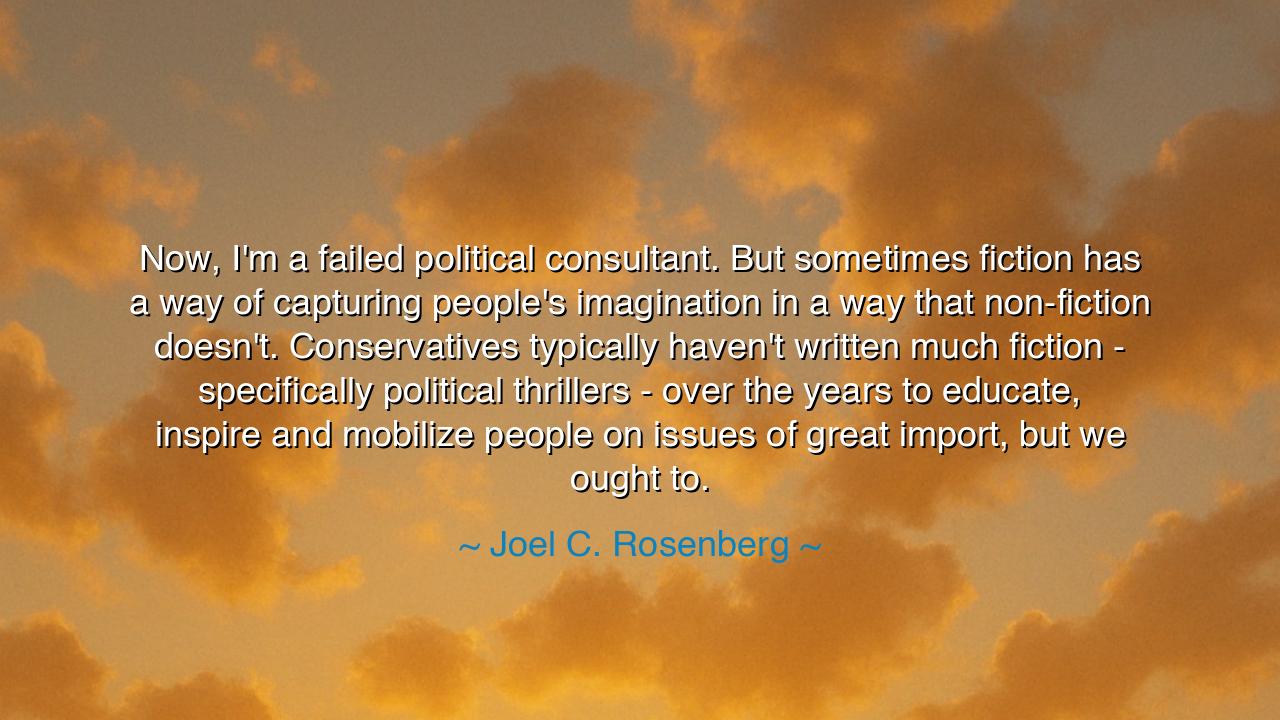
Now, I'm a failed political consultant. But sometimes fiction has
Now, I'm a failed political consultant. But sometimes fiction has a way of capturing people's imagination in a way that non-fiction doesn't. Conservatives typically haven't written much fiction - specifically political thrillers - over the years to educate, inspire and mobilize people on issues of great import, but we ought to.






“Now, I'm a failed political consultant. But sometimes fiction has a way of capturing people's imagination in a way that non-fiction doesn't. Conservatives typically haven't written much fiction — specifically political thrillers — over the years to educate, inspire, and mobilize people on issues of great import, but we ought to,” said Joel C. Rosenberg, the novelist whose stories of prophecy, politics, and faith have stirred the hearts of millions. His words are not merely about art or ideology — they are about the power of story, about the eternal truth that the imagination can reach where argument cannot, and that the heart, once moved, can accomplish what intellect alone never could. In this quote lies a revelation that transcends politics: that fiction, when wielded with vision, can awaken the soul to truths that logic leaves untouched.
Rosenberg speaks as one who has walked both paths — the corridors of political power and the inner sanctum of storytelling. In his confession of being a “failed political consultant,” there is humility, but also rebirth. For though he may have stumbled in the realm of strategy and policy, he found another battlefield — the imagination — and another weapon — the story. Where speeches fade and facts grow dull, fiction endures. A single tale can enter the mind like light into a darkened room, revealing not only what is but what might be. This is the ancient art of persuasion through narrative, the same power wielded by prophets, poets, and philosophers since the dawn of time.
Indeed, history itself confirms Rosenberg’s insight. Plato once warned that poets are dangerous, for they shape the souls of men. Yet even he, the master of reason, taught through dialogue and myth, for he knew that truth clothed in story walks farther than truth spoken naked. The parable was the chosen form of sages and saints — of Christ Himself, who revealed the mysteries of heaven not through doctrine, but through tales of mustard seeds and prodigal sons. These were not mere entertainments, but vessels of conviction, capable of transforming thought into action. Fiction, then, is not falsehood — it is truth embodied, truth made visible to the imagination.
Rosenberg laments that certain voices — those of the conservative tradition, in his case — have neglected this art, favoring reason over resonance, fact over feeling. Yet as he wisely observes, movements are not sustained by data; they are ignited by dreams. To educate, one must instruct the mind; but to inspire and mobilize, one must stir the spirit. Fiction accomplishes this by bridging the realms of reason and emotion, making the invisible visible and the abstract human. It teaches not by command, but by invitation — allowing readers to live, for a time, within another’s struggle, to see the world through another’s eyes, and to emerge changed.
We see this power throughout history. Consider Harriet Beecher Stowe, whose novel Uncle Tom’s Cabin shook the conscience of a nation. Her story, born of moral conviction and imagination, reached where pamphlets and political speeches could not. Abraham Lincoln himself is said to have called her “the little lady who started this great war.” Such is the might of fiction — to move the masses not by argument, but by empathy. It is this same might that Rosenberg urges his generation to reclaim: to use storytelling not merely to entertain, but to awaken, to guide, and to unite.
In his own novels, Rosenberg followed this very path. Blending prophecy with politics, suspense with scripture, he sought to educate and inspire through imagination — showing that the written word, when kindled by conviction, can shape both culture and destiny. His reflection, therefore, is not self-pity but a challenge to all creators: do not abandon the battlefield of the heart. The world is not changed by facts alone; it is changed by the stories people believe about themselves, their nations, and their purpose.
Let this then be the lesson: truth must be imagined before it can be realized. Do not scorn fiction as idle fancy, for it is the mirror of the soul and the forge of civilization. Use it not to deceive, but to reveal. Let your stories carry the weight of meaning and the light of hope. Whether you are a writer, a leader, or a dreamer, remember what Rosenberg teaches — that the power to shape the future belongs not only to those who legislate, but to those who imagine boldly. For the mind may reason, but it is the imagination that moves mountains.






AAdministratorAdministrator
Welcome, honored guests. Please leave a comment, we will respond soon